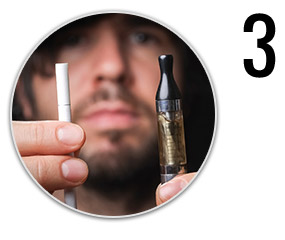Email Us at [email protected]
WARNING: This product contains nicotine. Nicotine is an addictive chemical.
Email Us at [email protected]
WARNING: This product contains nicotine. Nicotine is an addictive chemical.
When an industry like vaping becomes massively popular in a relatively short span of time, there will inevitably be critics, who are more than likely trying to serve their own agenda. Whether those skeptics are tobacco lobbyists trying to put a negative spin on their biggest competitor or media sources looking to earn easy views from posting misleading news, the truth is actual studies from physicians or market researchers are the only way to truly explain the health effects of using E-Cigarettes.
To help ensure our customers are getting the right info from the proper sources, we’ve collected eight revolutionary studies from proper authorities, all providing positive information on vaping - many of which haven’t been exposed to the general public.
A 2014 study from the National Center for Biotechnology Information (NCBI) specifically sought to prove vaping offers less long-term health risks than traditional tobacco cigarettes. After looking at data since 2004, they found there are roughly 480,000 cigarette-related deaths per year in the US and interjecting an alternative with smoke-free properties like vaping "would likely save the lives of 1.5 to 4.8 million of these Americans." They concluded that vaping "may be the greatest advance in reducing tobacco-attributable illness and death in decades."
A 2013 study reported in Tobacco World analyzed a dozen e-cigarette brands and determined the "levels of potentially toxic compounds in e-cigarette vapour are 9–450-fold lower than those in the smoke from conventional cigarettes, and in many cases comparable with the trace amounts present in pharmaceutical preparations [of nicotine]."
When Tobacco Control tested for potentially harmful constituents (carbon monoxide, carbonyls, phenolics, volatiles, metals, tobacco-specific nitrosamines, polyaromatic amines, and polyaromatic hydrocarbon), the combined weight of the constituents found in 99 hits from a Blu Classic Tobacco Disposable (accounts for 50% of the US market) was less than 0.17 milligram. In comparison, that's roughly the same amount of harmful constituents found in 99 puffs of air (0.16 milligram).
In 2014, a survey was conducted on students who attended a tobacco-free college, to determine whether or not introducing them to E-Cigarette usage would eventually lead to them shifting towards tobacco cigarettes. The survey consisted of 79.5% non-users, 13.8% single, 4.4% dual, and 1.5% poly users - with 49% having said they'd tried smoking tobacco prior. The results found that the introduction of E-Cigarettes into their daily routine "does not appear to lead to significant daily/non-daily use of cigarettes and SLT (smokeless tobacco)."
A 2013 study that combined research from a Onassis Cardiac Surgery Center in Greece and a Biological and Chemical Toxicology Research Laboratory in Italy intended to find how eLiquids contributed to cardiovascular disease. When the results were finally posted to The International Journal of Environmental Research and Public Health, tests of 20 different e-cigarette juices found little to no effect on cultured myocardial cells, suggesting eLiquids have no side effects on heart health.
A 2015 study by Abigail S. Friedman for the Journal of Health Economics looked to determine how access to electronic cigarettes affected smoking in adolescents, ranging from 12 to 17 year olds. The findings ended up saying that state bans on E-Cigs led to a "statistically significant 0.9 percentage point increase in recent smoking in this age group, relative to states without such bans."
A 2014 survey requested opinions from physicians regarding E-Cigarettes and their potential effect on traditional cigarette smokers. A total of 787 North Carolina doctors were contacted, with 128 of them fulfilling the survey. Two thirds (67%) of the physicians who responded "indicated e-cigarettes are a helpful aid for smoking cessation, and 35% recommended them to their patients. Physicians were more likely to recommend e-cigarettes when their patients asked about them or when the physician believed e-cigarettes were safer than smoking standard cigarettes."
A 2015 study from Dr David Dominic specifically sought to determine the potential benefits of nicotine, proving theories wrong that suggest the stigmatized stimulant is the most dangerous aspect of smoking cigarettes or E-Cigs. What Dominic found was that nicotine, when isolated outside of the tobacco it’s typically generated from, actually provides health benefits, such as: improved focus, enhanced motor skills and better short-term memory. When nicotine is not paired with tobacco, it has a totally different effect on the human body. Furthermore, the nicotine found in E-Cigs and Cigarettes is not considered a carcinogen, meaning that it does not cause cancer.
A 2016 study from Cambridge University aimed to validate the theory that E-Cigarette advertising led to increased smoking in children and underaged adults. Researchers examined the reaction of 589 kids aged from 11 to 16, after being exposed to various E-Cig promotions, assessing if their desire to try tobacco cigarettes increased. At the outset of the study, results proved E-Cig ads did not serve as a gateway to traditional smoking and "experimental evidence suggests that what e-cigarette advertising influences is attitudes towards vaping, not smoking, in line with basic marketing and advertising theory."







